Our coverage for today is endingpublished at 15:11 BST 29 June 2023
Thank you for joining us for our coverage today, we will resume on Monday afternoon where the focus turns to planning for a pandemic in Wales.
Scotland's former deputy first minister John Swinney, appearing before the UK Covid Inquiry, admits intergovernmental relations at the time of the pandemic was "pretty poor"
However, he adds that there was a good amount of co-operation and "reasonable practical engagement" between the four nations
Earlier, Scotland's former First Minister Nicola Sturgeon told chairwoman Lady Hallett that UK-wide emergency planning worked well in general, but it could be "ad hoc" in nature
She added that the Scottish government had "no choice" but to put efforts into the possibility of a no deal on Brexit and away from other planning
Sir Jeremy Farrar, a member of the Sage group of scientists who advised the government on Covid-19, was the first witness at today's session
You'll be able to watch the day's evidence sessions by clicking the Play button at the top of this page
The Covid-19 Inquiry was set up to examine the UK's response to pandemic - this phase is focusing on preparedness
Edited by Nichola Rutherford
Thank you for joining us for our coverage today, we will resume on Monday afternoon where the focus turns to planning for a pandemic in Wales.
The text coverage of the inquiry has now concluded. If you're just joining us, here's a quick recap of today at the UK Covid-19 Inquiry:
Thank you for joining us. You can continue to watch the inquiry by clicking on the play icon.
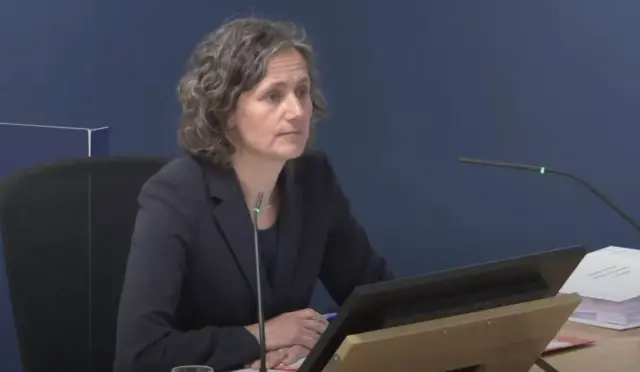
That also concludes the text coverage we are providing for today.
You can continue to watch the inquiry with us, just click on the play icon at the top of our page.
Catherine Frances, the director general for local government, resilience and communities in the UK government's department for Levelling Up, Housing and Communities, will now give evidence.
We turn now to questions from Claire Mitchell KC from Scottish Covid Bereaved, who now asks for comments on the evidence given by Dr Jim McMenamin from Public Health Scotland to the inquiry.
Mitchell asks if Swinney accepts McMenamin's evidence that Public Health Scotland did not have the budget or staffing levels to provide health protection for Scotland, pre-pandemic.
The deputy first minister insists there was a strength in the information available for decision making, but he does accept there were financial pressures.
Austerity has caused very challenging fiscal conditions, he says,
However the health budget grew to a greater extent than any other part of budget, he adds.
That concludes the evidence from John Swinney.
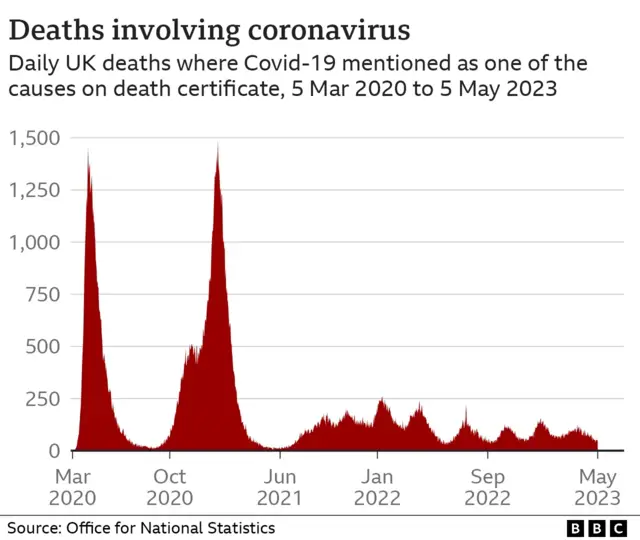
As the Covid-19 virus spread, government agencies increasingly published figures on case numbers, hospitalisations and deaths.
To follow alongside the inquiry, the BBC's data team has broken down some of these statistics into key areas from the beginning of the pandemic up to 5 May 2023, when the World Health Organisation declared an end to the virus as a "global health emergency", external.
John Swinney says one of the big problems of government is that it operates within individual compartments.
The SNP MSP says the Scotltish Leaders Forum was created to try to formulate a common direction of travel.
He explains there were routine conversations with the third sector and it had an ability to influence service delivery at a local level.
Kate Blackwell KC, counsel to the inquiry, says Inclusion Scotland have said disabilities were not factored in to emergency planning.
The former deputy first minister replies he was troubled by the contents of the Inclusion Scotland submission.
He reiterates the government put in efforts to try and ensure the third sector had a voice.
"That can and should be rectified by the Scottish government."
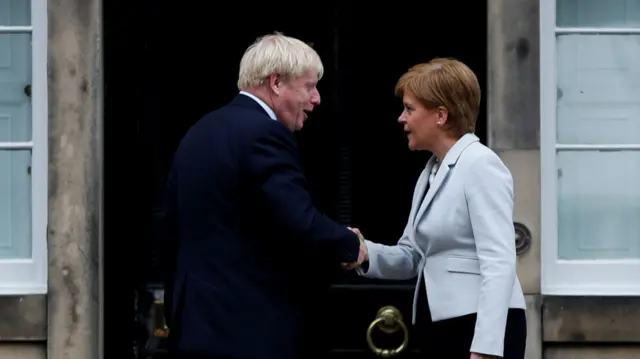 Image source, Reuters
Image source, ReutersFormer Prime Minister, Boris Johnson, meets former First Minister, Nicola Sturgeon at Bute House in 2019
Kate Blackwell KC, counsel to the inquiry, begins the afternoon evidence session by asking John Swinney about intergovernmental relations.
The former deputy first minister says there was a pretty good amount of co-operation between the Scottish and UK governments in an emergency.
However "generally relationships were pretty poor" partly due to the prospect of a no-deal Brexit, he explains.
Former deputy first minister John Swinney will now continue giving evidence to the Covid-19 Inquiry.
Later in the afternoon the inquiry will hear from Catherine Frances, the director general for local government, resilience and communities in the UK government's department for Levelling Up, Housing and Communities.
If you're just joining us, here's a quick recap of this morning at the UK Covid-19 Inquiry:
Join us again at 13:45 for further updates and analysis of John Swinney's evidence.
There will now be a break for lunch.
The inquiry will get under way again at 13:45.
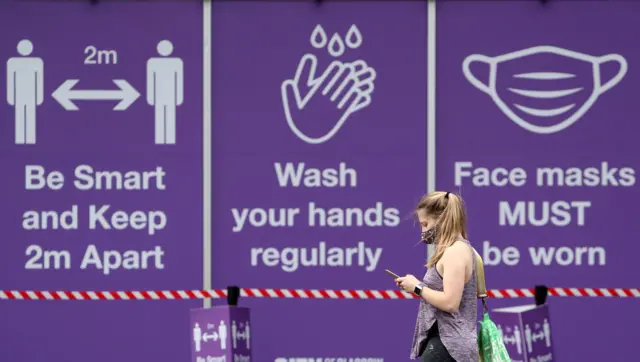 Image source, PA Media
Image source, PA MediaOver 50% of Scots had Covid-19 between September 2020 and February 2022.
While we continue to keep across John Swinney's evidence to the UK Covid Inquiry, let's remind ourselves of the impact the pandemic had on Scotland.
According to the Office for National Statistics, an estimated 2.7million people in Scotland had Covid-19 between 22 September 2020 and 11 February 2022.
This represents 51.5% of the population.
Since the first reported death on 13 March 2020, more than 12,500 people in Scotland died with coronavirus.
Here are the stories of some of those who have lost their lives.
The conversation moves on to the UK influenza Pandemic Preparedness Strategy and if it should have been updated since 2011.
Swinney says he was not specifically aware of plans to update the plan.
Swinney is asked about “pragmatic co-operation” between the Scottish and UK governments in terms of preparation.
“Examples of that would be collaboration around some of the expert advice that was available”, he says, before saying organisations from Scotland would interact with groups like Sage.
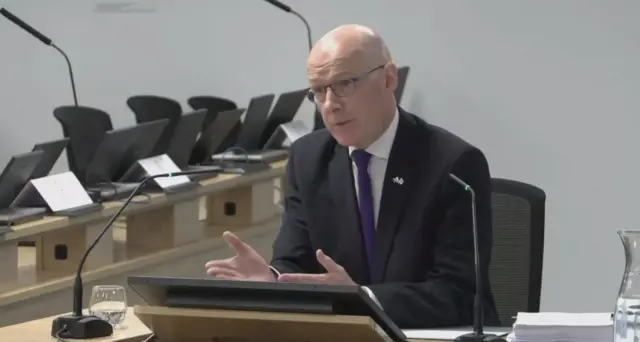
He goes on to say there would co-operation around some aspects of procurement of items like PPE and goes on to say there was no value in Scotland taking a “different process”.
He is then asked if pandemic planning should have been UK-wide.
“I would say that, yes” Swinney responds.
Back to the testimony from the former deputy first minister and Swinney tells the inquiry structures were developed which involved the creation of a Scottish Resilience Partnership with a range of organisations participating.
There were a number of resilience issues that had arisen since 2010.
"These issues have kept me awake at night," admits the former deputy first minister.
Before her evidence concluded, Sturgeon took a few questions from Aamer Anwar, acting on behalf of Scottish Covid Bereaved group.
He presents some findings from the joint expert report prepared for the inquiry and asks if she accepts the analysis also applies to the Scottish government’s planning – she says “broadly” she would.
Anwar goes on to ask what extent the Scottish government carry out an equalities and human rights assessment of its plan.
Sturgeon says the government does carry out different impact assessment both in the preparedness and the response phase.
He then asks to what extent the plans would work with protected characteristics such as age and race, Sturgeon says this was part of the assessment which was carried out routinely.
And that concludes Sturgeon’s evidence.
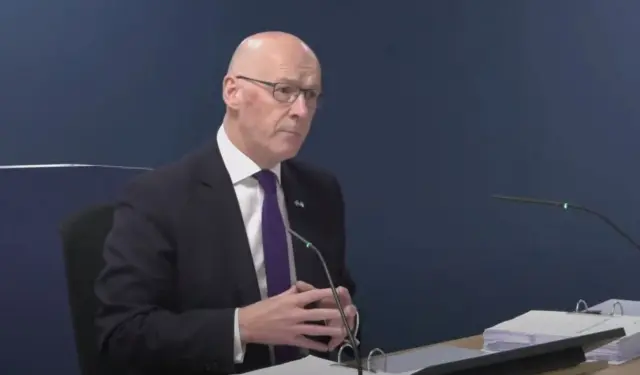
John Swinney expresses his sympathy to everyone affected by Covid and adds a thank you to all who worked to combat the virus.
The former deputy first minister explains it was his role to ensure Scotland had in place effective resilience measures.
"Resilience has got to be everybody's business," he explains.
"Life was always pretty hectic, to be honest," says Swinney with a wry smile.

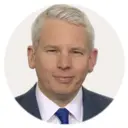 Andrew Kerr
Andrew Kerr
Scottish political correspondent
Brexit reared its head again at the Covid Inquiry – as it did on Tuesday and Wednesday.
Yesterday, the former Scottish health secretary Jeane Freeman said that resources were diverted away from pandemic planning to prepare for a possible no-deal exit from the EU.
Today, the former first minister repeated that.
There was huge concern about a chaotic departure from the EU – hitting food and medicine supplies.
Counsel to the Inquiry questioned if this was a false economy?
Ms Sturgeon said every aspect of Brexit was a false economy – but was chided by Hugo Keith KC, saying she was in a witness box and not a soap box.
Nevertheless, it’s been an important feature in pandemic preparation – although the former UK Health Secretary Matt Hancock said planning for a no-deal Brexit meant the UK had a plentiful supply of intensive care medicine.
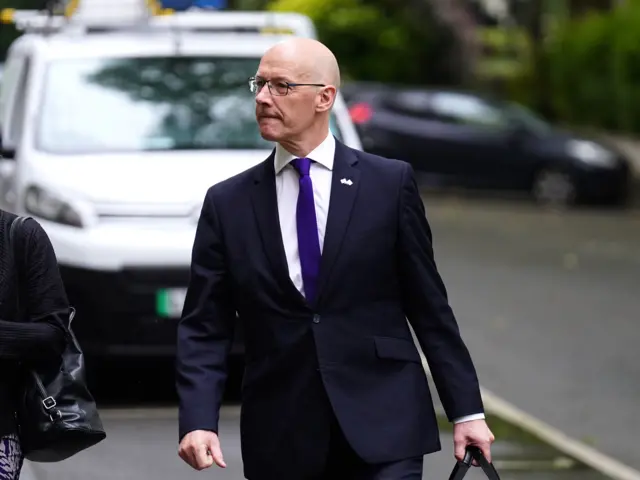 Image source, PA Media
Image source, PA MediaJohn Swinney arrives at Dorland House in London for the UK Covid-19 inquiry
That concludes the evidence session with Nicola Sturgeon.
It's now the turn of her former deputy first minister John Swinney and he is sworn in.
Sturgeon is asked about the Standing Committee on Pandemic Preparedness - an advisory group to the Scottish government - and if it’s already issued a report with recommendations.
She responds by talking about the three interim recommendations: proposing a centre for pandemic preparedness, another related to data and analytics infrastructure and a third on how to build scientific advisory networks throughout the UK and beyond.
Lead Counsel Hugo Keith KC has now finished questioning Nicola Sturgeon.
Final questions are from Aamer Anwar who is representing a core participant of the inquiry: Scottish Covid Bereaved.